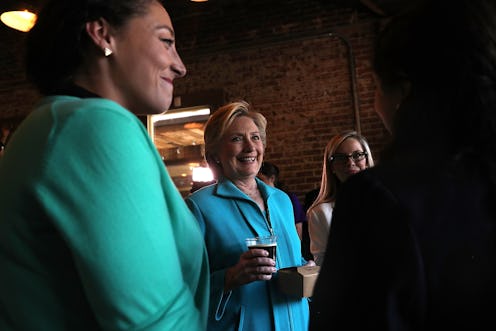News
Wait, Why Do Nominees Have Classified Briefings?
It's only a few months until the 2016 presidential election, and things are getting real for the two nominees. Hillary Clinton reportedly had her first classified security briefing as a nominee on Saturday, and while it seems a little presumptive to hold super-secret classified meetings long before you've been elected to the White House, the Democratic presidential candidate is actually a little behind. Donald Trump, the GOP's presidential nominee, had his first classified briefing more than a week earlier. Why would these two presidential candidates even hold these briefings during election season? Apparently, it's a practice that has been going on since the early 1950s.
According to the Washington Post, these classified briefings for presidential nominees by federal agents are granted by the sitting president. (So, in this case, President Obama.) They aren't mandatory for each presidential nominee, and the sitting president has the power to deny these briefings if he or she chooses.
Historian Michael Beschloss told the Washington Post that the first classified briefings for presidential nominees occurred in 1952, when then-President Harry Truman was about to leave office. According to Beschloss, Truman had both Republican nominee Dwight Eisenhower and Republican nominee Adlai Stevenson briefed on national security issues; CIA agents reportedly conducted the briefings.
These briefings have continued well into this century. Back in 2012, Republican nominee Mitt Romney received intelligence briefings at around the same time in the election cycle. Romney was briefed following the Republican National Convention, which occurred in late August that year.
Not all presidential candidates may need these briefings. CNN reported in 2012 that it was especially important for Romney to receive national security briefings because, as a businessman, he was never privy to classified intelligence. However, past presidential candidates like Obama and Sen. John McCain served on committees in the U.S. Senate that would have already granted them access to certain intelligence and data.
These briefings appear to be way more important for those candidates with either little to no political background (e.g. Trump) or state-level experience. George W. Bush, for example, was briefed by CIA officials during the 2000 election cycle. Bush had served as the governor of Texas, but never held a position in the House of Representatives or U.S. Senate.
The briefing was held at Bush's ranch in Crawford, Texas, the Washington Post reported at the time. Bush even thanked the (Bill) Clinton administration for "following the tradition of briefing a candidate who is running for president of the United States about national security issues."
It doesn't matter the political affiliation of the president or relationship with the nominees — this tradition seems like a lasting courtesy in American politics.
